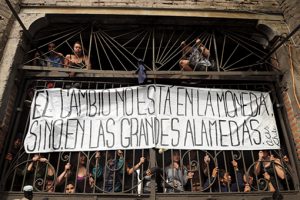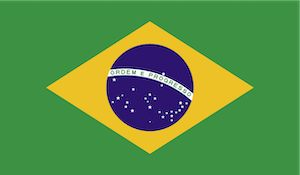Brazil’s Gas Station Blues
The result was conclusive from Brazil’s fifth and final presidential debate last night, which started at 11 pm so as not to conflict with the soap opera “Imperio”: Sunday’s election is too close to call. (And also, candidates’ plans for Brazil’s future are less important to Brazilian telenovela fans than the fictional future of Rio … Read more
Dilma, Dilma, Dilma
Dilma, Dilma, Dilma, Neves, Sil-. The letters in this sentence roughly represent the proportion of free TV airtime that each of Brazil’s three major presidential candidates—President Dilma Rousseff and challengers Aécio Neves and Marina Silva—receives to advertise, based on their party’s representation in government. Because Silva’s Partido Socialista Brasileiro (Brazilian Socialist Party—PSB) has minimal representation … Read more
Brazil Will Not Sign Global Anti-Deforestation Initiative
Brazilian Environment Minister Izabella Teixeira stated yesterday that Brazil will not sign a global anti-deforestation initiative that will be announced at the United Nations Climate Summit today. Teixeira affirmed that the UN failed to confer with Brazil on the matter and instead simply gave the country a copy of the document and requested that they … Read more
Shale Gas Development in Latin America
New technology and capital has boosted shale gas and tight oil production in the United States and Canada—a phenomenon dubbed the “shale revolution.” This revolution has important geopolitical implications and has shifted North America’s energy outlook from one of scarcity to one of abundance. The rest of the Western Hemisphere is also sitting on expansive … Read more
Monday Memo: Venezuela in the UN – Brazilian Stalemate – U.S. Deportation – Santander – Ecuadorian protests
This week’s likely top stories: Venezuela is expected to win a seat on the UN Security Council; Brazilian President Rousseff and Marina Silva are tied in a new poll; U.S. deportations are at their lowest level since 2007; Santander’s new chairwoman will maintain the bank’s current strategy; Ecuadorian President Correa asks supporters to mobilize against … Read more
Poll Shows Likely Tie in Brazilian Runoff
A survey published on Tuesday by the polling firm MDA and commissioned by the Confederação Nacional do Transporte (National Transport Confederation—CNT) showed that Brazilian incumbent President Dilma Rousseff would be statistically tied with Partido Socialista Brasileiro (Brazilian Socialist Party—PSB) candidate Marina Silva if the elections went to the second round on October 26. The poll, which surveyed 2,002 respondents from September 5 to September 7, revealed a 4.9 percentage … Read more
Monday Memo: U.S. Immigration – Petrobras Scandal – Francisco Flores – Private Equity – Chile’s September 11
This week’s likely top stories: Barack Obama delays executive action on immigration; a former Petrobras director names 40 politicians in scandal; former Salvadoran President Flores turns himself in; private equity fundraising in Latin America this year could reach $8 billion; Chileans remember September 11, 1973. Immigration reform stalled: U.S. President Barack Obama’s promise to use … Read more
Rousseff and Silva Battle in Second Presidential Debate
Presidential hopeful Marina Silva of the Partido Socialista Brasileiro (Brazilian Socialist Party—PSB) and incumbent President Dilma Rousseff of the Partido das Trabalhadores (Worker’s Party—PT) harshly criticized each other’s economic plans, leading to tension during yesterday’s second presidential debate. The Partido da Social Democracia Brasileira (Party of Brazilian Social Democracy—PSDB) candidate Aécio Neves and five other … Read more
Monday Memo: Marina Silva – Colombian Peace Talks – Mexican Energy – Julian Assange – Toxic Spill in Mexico
This week’s likely top stories: Marina Silva agrees to face Dilma Rousseff in Brazil’s presidential election; victims of Colombia’s armed conflict speak to peace negotiators; Mexico will announce new energy projects; Julian Assange plans to leave Ecuador’s embassy “soon”; classes in Mexico are suspended due to a copper mine’s toxic spill. Marina Silva agrees to … Read more
Brazil’s Eduardo Campos Killed in Plane Crash
Brazilian presidential candidate Eduardo Campos and six other people were killed Wednesday morning when the plane they were traveling in crashed in the coastal city of Santos in São Paulo state. Brazilian television reports said that the plane, a Cessna 560XL, struggled in bad weather and hit a three-story building in the neighborhood of Boqueirao, … Read more
Brazil’s INOVAR: Building an Entrepreneurship Ecosystem
Lately, Brazil has been in the business of building things from the ground up. From stadiums that hold millions of people to entire market ecosystems, this is challenging work for a government. In anticipation of the World Cup, Brazil received heavy criticism for its infrastructure development. However, Brazil’s efforts at developing an entrepreneurship ecosystem have … Read more
Mexico’s Energy Reform: Lessons from Colombia and Brazil
In the early 2000s, Colombia’s oil industry was weakening. There had been a decrease in new discoveries, followed by a decline in production from a peak of 800,000 barrels per day (b/d) in 1999 to nearly 550,000 b/d in 2004. Exploration and production had moved to increasingly remote areas with higher security risks and risky … Read more
Brazil’s Marina Silva Calls For a New Vision of Development
From the age of 10, Marina Silva would wake up before dawn to prepare food for her father, so that he could set off through the dense jungle before the heat of the tropical sun made it impossible for him to keep working. In Silva’s community of rubber tappers in Brazil’s northwestern state of Acre, … Read more
Monday Memo: Mercosur Summit – General Hugo Carvajal – Gov. Jerry Brown – Mexican Energy Reform – Argentine Debt
This week’s likely top stories: Mercosur leaders meet in Caracas; former General Hugo Carvajal returns to Venezuela; California Governor Jerry Brown visits Mexico; Mexican Congress discusses energy reform; Argentina nears its debt deadline. Mercosur leaders to address Israel at Mercosur summit: Brazilian President Dilma Rousseff is expected to lead Mercosur leaders in condemning Israel’s military … Read more

Protest U.
Millions of students have taken to the streets across Latin America in recent years in protests that reflect an unprecedentedly broad mobilization of popular opinion. Following massive demonstrations led by secondary school students in 2006 in Chile, university students launched a series of protests in May 2011. Powered by a coalition of public and private … Read more



